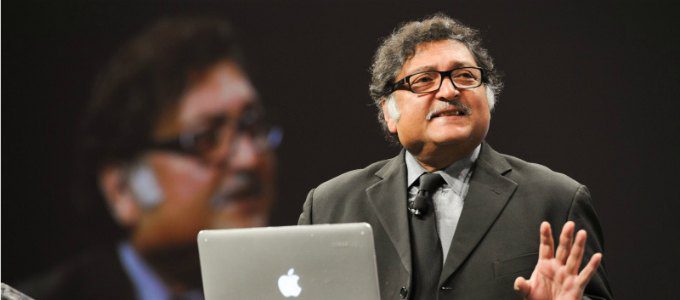Sumata Mitra presents the Tuesday keynote at ATD's 2015 conference in Orlando, Florida. (Photo courtesy of ATD)
The second time around of anything is usually never as good as the first, but day two of ATD 2015 started with a big old bang.
Sugata Mitra knocked it out of the park with his opening keynote on the future of learning, and set a bar for the rest of the conference that not only discussed disruptive learning, but also it praised and encouraged it.
Mitra, best known for his so-called “Hole in the Wall” experiments in India, which helped spawn popular movie “Slumdog Millionaire,” is a professor of educational technology at the School of Education, Communication and Language Sciences at Newcastle University in England. He is also the winner of the TED Prize for 2013.
After listening to the results of his research over the past 15 years or so, it makes one wonder how and why the traditional educational system can sleep at night. With skills gaps and associated performance deficits at the forefront of most learning leaders’ minds these days — whether the conversation is strategic or tactical in nature — Mitra’s results seem to speak for themselves: We need a revolution.
Traditional learning environments, he said, were built to support a world that no longer exists. What we need now is SOLE. Not soul — although it might not hurt — but self-organized learning environments. SOLE changes the focus from pushing out, static, standard learning curriculums to enabling freewheeling, creativity and collaboration enhancing learning spaces fueled by technology and students’ endless desire to learn.
Many of Mitra’s breakthroughs feature school-age children, but he has begun to experiment with SOLE for adult learning as well. He posits that the key to making more inflexible, conditioned adults loosen up and try things in a new way is to make them feel safe, curtail the instinct to compete and, perhaps most important, let them know that their efforts to change have value.
It makes sense. We’re all busier than ever. Half the reason people don’t want to try something new is because they don’t know if the new thing will matter. Will the time they invest to learn bring tangible rewards? Will the new learning help them get their work done better, faster? Will it affect the company’s bottom line? Sometimes the answer is no. But that’s where making the grownups feel safe comes in. It has to be OK culturally — from leaders at the top all the way to the front line — to change things up.
On day three of the conference, Kaplan’s JD Dillon held a session on strategies to Transform Users into Contributors, and he talked about how important it is for adoption to get everyone comfortable with the range of tools available. Further, he said being completely transparent about who has access to a company’s system, rewarding people for contributing, and opening the door to some friendly, respectful online debate is an excellent, completely organic way to effect change — including policy and procedural change — in an organization.
Learning is not a singular construct by any means. It can happen in many ways, through many different mediums, and involve people of all levels and types. But one has to be open to difference. It’s the only way organizations can be successful and be sure they’re embracing every opportunity that comes their way in today’s global marketplace.
For example, in his session, Fernando Sanchez-Arias of Mejorar said that leaders have to want to learn about new cultures; they should explicitly see the value in this kind of development. Further, they have to be willing to put in the work to overcome that stupid American stereotype that often precedes U.S. executives to other locales.
In a global context, it only makes sense to learn the do’s and don’ts, what’s taboo, what cultural and socioeconomic morays and current events could affect the people in a certain place — and one’s ability to do business with them. To ignore these things is to court million-dollar business disasters as many big companies have found out to their detriment.
All in all, ATD 2015 waved a rather prominent flag promoting technology and change, and that’s very much a good thing.















